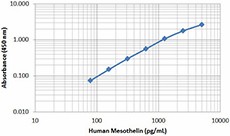- Regulatory Status
- RUO
- Other Names
- Antigen recognized by antigen K1, megakariocyte potentiating factor (MPF), soluble MPF, mesothelin releated protein
- Ave. Rating
- Submit a Review
- Product Citations
- publications

| Cat # | Size | Price | Quantity Check Availability | Save | ||
|---|---|---|---|---|---|---|
| 593209 | 4 pack | £65 | ||||
Human mesothelin, also known as CAK1 and MSLN, is a cell-surface protein that is expressed on normal mesothelial cells lining the pleura, pericardium, and peritoneum. It is expressed as a 70 kD pre-cursor protein with a furin cleavage site, which produces two products: 1) megakaryocyte potentiating factor (MPF) (30 kD) and 2) mesothelin (40 kD). MPF is a cytokine that is released. Mesothelin, for the most part, is membrane-bound by a glycosylphosphatidylinositol linkage and has three glycosylation sites. Soluble mesothelin is believed to result from proteolytic cleavage to release it from the membrane linkage, or from alternative splicing of the mesothelin gene.
The normal function of mesothelin is not known. Mice knockouts produced no obvious phenotypes with normal growth and reproductive parameters. However, mesothelin is overexpressed by cancer cells, particularly in mesotheliomas, ovarian adenocarcinomas, pancreatic adenocarcinomas, and squamous cell carcinomas, and lung cancers. It binds to MUC16/CA-125, which is a cell surface mucin and ovarian cancer biomarker, and has been speculated to be involved in peritoneal dissemination of ovarian cancer cells. Mesothelin has also been shown to be elevated in the serum of cancer patients compared to normal patients. As such, it has become the focus of cancer research in the areas of diagnostics, immunotherapy, and cancer vaccinology. For example, SS1P is a recombinant immunotoxin which targets mesothelin-expressing cancer cells. Its anti-mesothelin Fγ domain confers specificity, while its Pseudomonas exotoxin domain results in cell death. This potential drug has already finished Stage I clinical trials.
Product Details
- Source
- Human mesothelin, (amino acids Glu296-Gly580) (Accession# BC009272), with a C-terminal 6His, was expressed in 293E cells.
- Molecular Mass
- The predicted molecular mass of human mesothelin is ~40 kD.
- Purity
- >95%, as determined by Coomassie stained SDS-PAGE.
- Formulation
- Lyophilized in sterile-filtered PBS, pH 7.2, containing 1% BSA, 0.09% sodium azide, and protease inhibitors.
- Concentration
- Lot-specific (to obtain lot-specific concentration and expiration, please enter the lot number in our Certificate of Analysis online tool.)
- Storage & Handling
- Unopened vials can be stored between 2°C and 8°C until the expiration date. Prior to use, reconstitute the lyophilized powder with 0.2 mL of PBS containing a carrier protein (e.g., 1% BSA, protease free), pH7.4. Re-cap vial, vortex. Allow the reconstituted standard to sit at room temperature for 15 minutes, vortex again to mix completely. The reconstituted standard stock solution can be aliquoted into polypropylene vials and stored at -70°C for up to one month. Do not re-use diluted standards. Avoid repeated freeze/thaw cycles.
- Application
-
ELISA
- Recommended Usage
-
To measure human mesothelin, this recombinant protein can be used as a standard in a sandwich ELISA format, when used in conjunction with the purified (clone MN) antibody (Cat. No. 530101) as the capture antibody, and the biotinylated (clone MB) antibody (Cat. No. 530203) as the detection antibody. A standard curve comprised of 2-fold dilutions from 5,000 to 78 pg/ml is recommended, and the end-user should titrate each lot of reagents for optimal performance.
Antigen Details
- Structure
- ~40 kD glycoprotein that can be membrane-bound, or released from the membrane in a soluble form.
- Distribution
-
Mesothelial cells lining the pleura, peritoneum, and pericardium. It is also located in various cancer cells.
- Function
- Not known. May promote carcinogenesis and metastasis.
- Interaction
- Various cancer cells such as ovarian and pancreatic cancer cells.
- Ligand/Receptor
- CA125 (MUC16).
- Biology Area
- Cancer Biomarkers, Cell Adhesion, Cell Biology
- Molecular Family
- Cytokines/Chemokines
- Antigen References
-
1. Pastan I, et al. 2014. Cancer Res. 74:2907.
2. Hellstrom I, et al. 2011. Expert Opin. Med. Diagn. 1:227.
3. Hassan R, et al. 2008. Eur. J. Cancer 44:46.
4. Hassan R, et al. 2006. Clin. Cancer Res. 2:447.
5. Onda M, et al. 2005. Clin. Cancer Res. 16:5840-6.
6. Hassan R, et al. 2004. Clin. Cancer Res. 10:3937.
7. Scholler N, et al. 1999. Proc. Natl. Acad. Sci. 96:11531. - Gene ID
- 10232 View all products for this Gene ID
- UniProt
- View information about Mesothelin on UniProt.org

 Login / Register
Login / Register 
















Follow Us